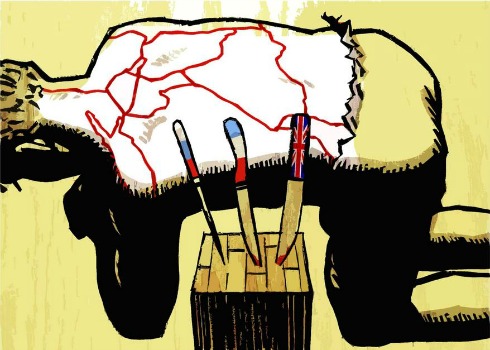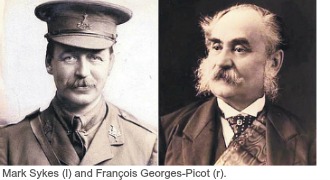Archives
AND MORE...

U.S. Fumble Policy
_____________________

Befuddled Responses
_____________________

Make-Believe Foreign Policy
_____________________

Calling On US Billionaires
_____________________

New World Order
_____________________
May 9, 2016
A Bad Agreement Turns 100
On May 16, 2016 the Asia Minor Agreement (aka Sykes-Picot) turned 100 years old. Sykes-Picot is the agreement that has shaped and distorted the modern Middle East (see piece below).
Nevertheless, as Daniel Pipes writes below, this foul agreement has an important lesson for present day:
"Foreign powers must not attempt unilaterally to decide the fate of distant regions, and especially not in a clandestine manner. This may sound like outdated or obvious advice but, at a time of failed states and anarchy, the powers again find it tempting to take matters in their own hands, as they did in Libya in 2011, where their intervention failed dismally. Similar efforts could lie ahead in Syria, Iraq and Yemen. Beyond those conflicts, Michael Bernstam of the Hoover Institution has argued for a broader redrawing of the region's 'antiquated', artificial map'.
No. Rather than seek to impose their will on a weak, anarchic region, the powers should hold back and remind locals of their own need to take responsibility. Rather than treat Middle Easterners as perpetual children, outsiders should recognize them as adults and help them succeed."
Sounds good, although treating Middle Easterners as adults rather than "perpetual children" also means not coddling or tolerating barbaric behavior, especially when it affects America or its allies.
The Washington Times | May 8, 2016
'A Shocking Document' Turns 100
The secret agreement that shaped the Middle East set the stage for lethal instability
By Daniel Pipes

Illustration on the effects of Sykes-Picot 100 years later. Alexander Hunter/The Washington Times
The Sykes-Picot accord that has shaped and distorted the modern Middle East was signed 100 years ago, on May 16, 1916. In the deal, Mark Sykes for the British and Francois Georges-Picot for the French, with the Russians participating too, allocated much of the region, pending the minor detail of their defeating the Central Powers in World War I.
Sykes-Picot (official name: the Asia Minor Agreement) bears recalling because its profound two mistakes are in danger of being repeated: one concerned form and the other substance.
Form: Negotiated in secret by three European imperial powers, it became the great symbol of European perfidy. Not surprisingly, the Allied Powers secretly carving up the central Middle East without consulting its inhabitants prompted an outraged response (George Antonius, writing in 1938: “a shocking document the product of greed at its worst a startling piece of double-dealing”). Sykes-Picotset the stage for the proliferation of a deeply consequential conspiracy-mentality that ever since has afflicted the region.
Sykes-Picot created a miasma of fear about foreign intervention that explains the still widespread preference for discerning supposed hidden causes over overt ones. What in 1916 appeared to be a clever division of territory among allies turned out to set the stage for a century of mistrust, fear, extremism, violence and instability. Sykes-Picot contributed substantially to making the Middle East the sick region it is today.
Substance: In simple terms, France got Syria and Lebanon, Britain got Palestine and Iraq. But it was operationally not so simple, as borders, administrations, and competing claims needed to be worked out. For example, French forces destroyed the putative kingdom of Syria. Winston Churchill one fine afternoon conjured up the country now known as Jordan. Under pressure from Lebanese Catholics, the French government increased the size of Lebanon at the expense of Syria.
 But the largest issue, of course, was the issue of control over the area of the Holy Land, or Palestine, a problem complicated by London’s having promised roughly this area to both the Arabs (in the McMahon-Hussein correspondence of January 1916) and the Zionists (in the Balfour Declaration of November 1917). It appeared that London had not just sold the same territory twice but also double-crossed Arabs and Jews by arranging (in Sykes-Picot) itself to retain control over it.
But the largest issue, of course, was the issue of control over the area of the Holy Land, or Palestine, a problem complicated by London’s having promised roughly this area to both the Arabs (in the McMahon-Hussein correspondence of January 1916) and the Zionists (in the Balfour Declaration of November 1917). It appeared that London had not just sold the same territory twice but also double-crossed Arabs and Jews by arranging (in Sykes-Picot) itself to retain control over it.
From the vantage point of a century later, Sykes-Picot has an almost purely malign influence without redeeming qualities. It laid the basis for the future rogue states of Syria and Iraq, the Lebanese civil war, as well as exacerbating the Arab-Israeli conflict.
On its centenary, Sykes-Picot’s central achievement, the creation of the Syrian and Iraqi states, appears to be in tatters. In a surprising parallel, each has rapidly devolved from the all-powerful totalitarianisms of Hafez al-Assad and Saddam Hussein into three microstates. Both have an Iranian-backed, Shi’ite-oriented central government; a Turkish- and Saudi-backed Sunni opposition; and a U.S.- and Russian-backed Kurdish force.
The Islamic State (or ISIS, ISIL, Daesh) proclaimed “the end of Sykes-Picot” when it eliminated border posts along the Syria-Iraq border; nevertheless, many observers, including myself, see the fracturing of these two rogue states into six ministates on balance as a good thing because the small states are more homogeneous and less powerful than the prior regimes.
Sykes-Picot has a lesson for the present day, a simple and important one: foreign powers must not attempt unilaterally to decide the fate of distant regions, and especially not in a clandestine manner. This may sound like outdated or obvious advice but, at a time of failed states and anarchy, the powers again find it tempting to take matters in their own hands, as they did in Libya in 2011, where their intervention failed dismally. Similar efforts could lie ahead in Syria, Iraq and Yemen. Beyond those conflicts, Michael Bernstam of the Hoover Institution has argued for a broader redrawing of the region’s “antiquated, artificial map.”
No. Rather than seek to impose their will on a weak, anarchic region, the powers should hold back and remind locals of their own need to take responsibility. Rather than treat Middle Easterners as perpetual children, outsiders should recognize them as adults and help them succeed. Only in this way, over time, will the volatile, brutal, failed Middle East evolve into something better. Only in this way will it overcome the foul legacy of Sykes-Picot.
Daniel Pipes is president of the Middle East Forum.
Original article here.
Log In »
Notable Quotables
"Mr. Netanyahu is one of the most media-savvy politicians on the planet. On Friday he appeared live via video link on 'Real Time with Bill Maher,' taking the host’s alternately sardonic and serious line of questioning with gazelle-like alacrity."
~ Anthony Grant, jourrnalist who has written for many major newspapers and worked in television at Paris and Tel Aviv, interviewing former PM Benjamin Netanyahu on Monday, at the outset of Mr. Netanyahu's new book (more here).


